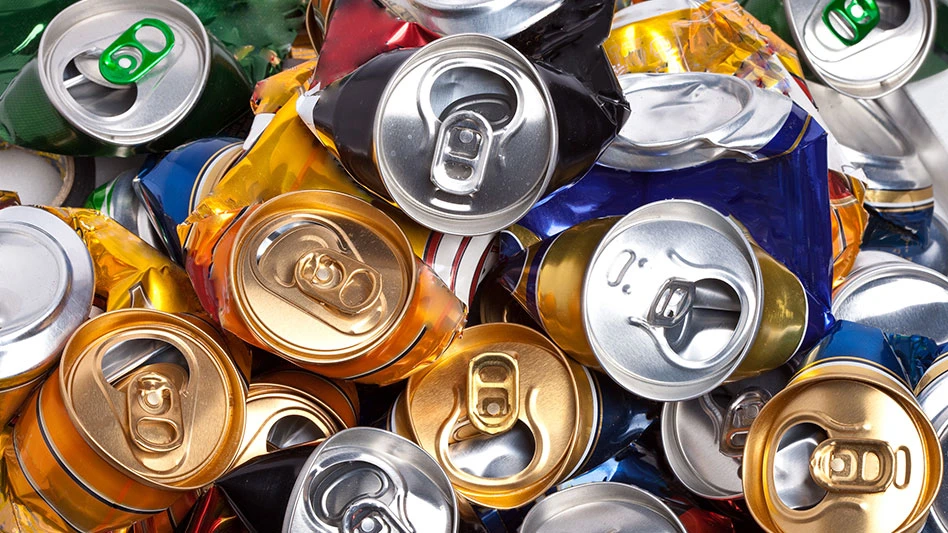
kkulikov.com | stock.adobe.com
The Washington-based Can Manufacturers Institute (CMI) is using an innovative financing model to fund a robot at a California material recovery facility (MRF) owned by Caglia Environmental, headquartered in Fresno, California, that sorts single-stream recyclables.
Designed by Fremont, California-based artificial intelligence and robotics company EverestLabs, the robot is expected to capture a little more than 1 million used beverage cans (UBCs) a year. CMI used funding from its members Luxembourg-based Ardagh Metal Packaging and Crown Holdings, Philadelphia, to finance the two-year equipment lease for Caglia.
This lease program is the latest in a multiyear CMI effort to demonstrate the additional revenue that could be raised by capturing missorted UBCs and to spur the installation of additional equipment to capture cans in MRFs.
“We are excited about the lease model because it highlights that aluminum beverage cans are consistently one of the most valuable recyclable commodities,” says John Rost, vice president of global sustainability and regulatory affairs at Crown. “CMI research has concluded that without the vital revenue from UBCs, most MRFs would not be able to operate without a change to their business model.”
The potential to capture missorted UBCs at MRFs is significant. CMI’s 2020 research, “Aluminum Beverage Can: Driver of the U.S. Recycling System,” found that up to 1in 4 aluminum beverage cans is missorted at a typical MRF. CMI also supported on-the-ground testing in 2022 at five loss points across three diverse MRFs. This testing found an average loss of seven to 36 UBCs per minute, which represents an annual average revenue loss of $71,900. CMI has commissioned a return-on-investment calculator for MRFs to use to determine the effect of buying an additional eddy current separating system.
Even at a sophisticated MRF like Caglia’s at the Cedar Avenue Recycling and Transfer Station (CARTS) in Fresno, there is the potential to capture additional cans. This facility, which focuses on continuous improvement and has a recently upgraded single-stream sort line, will place the leased robot on its “last chance line” to capture UBCs mistakenly sorted into a line of materials headed for landfill.
“We put EverestLabs’ robot on the last chance line and have it focusing on aluminum beverage cans so that it’s picking ‘gold’ out of the trash,” says Corey Stone, plant maintenance manager at CARTS. “This lease provides a no-risk, no-cost way for Caglia to advance its goal of capturing all recoverable material coming through its facility. EverestLabs’ real-time and easy to use analytics platform, alongside an easily retrofittable robotic cell with zero disruptions and guaranteed highest recovery in the industry, ensures all possible UBCs are recovered. With CMI wanting to recycle more aluminum beverage cans and Caglia becoming a recycling industry leader, this program is a win-win for everyone.”
Caglia estimates, based on previous analyses, that EverestLabs’ robot could capture 32,000 pounds of UBCs per year that otherwise would have gone to landfill. This is equivalent to collecting a little more than 1 million UBCs per year or around three UBCs per minute of operation. Caglia will share with CMI 50 percent of all revenue from the cans collected via the leased robot, including the revenue from the sale of the UBCs and the revenue from California’s beverage container recycling refund program.
“Considering metal recycles forever—with 93 percent of recycled aluminum beverage cans turned into new cans and recycled aluminum [being] 94 percent less carbon-intensive than making primary aluminum—it is imperative that recycling sortation facilities capture all cans for the aluminum industry to buy and recycle,” Ardagh Metal Packaging – North America CEO Jens Irion says.
Now that EverestLabs’ 3D depth-sensing camera, AI and robot have been installed at Caglia’s Fresno MRF, the RecycleOS data platform is delivering daily reports on the number of missorted UBCs each day, along with the economic value of these cans and the greenhouse gas emissions saved from recycling them. So far, the equipment is seeing up to 1,400 UBCs per day and recovering a majority of them so they go into the circular supply chain rather than going to landfill. Caglia, CMI and EverestLabs plan to provide updates with further data after the equipment has operated for a longer period of time. Caglia plans to use the experience with this robot to see how else it can deploy technology at its MRF to maximize its recovery efforts. CMI intends to support additional can capture equipment at MRFs with the lease model and will use learnings from this first lease to refine its approach to can capture equipment financing.
“EverestLabs is delighted to partner with Can Manufacturers Institute, Crown, Ardagh Metal Packaging and Caglia Environmental to increase UBC recovery using RecycleOS, our purpose-built AI and automation platform for MRFs and manufacturers,” says JD Ambati, founder and CEO of EverestLabs. “With new investment models, we can speed adoption of AI solutions to eliminate losing UBCs to landfill, as this is a massive loss for the entire ecosystem.”
EverestLabs, CMI and Caglia Environmental will hold an Institute of Scrap Recycling Industries (ISRI) webinar titled “Industry Partnerships Driving AI and Robotics Deployment in MRFs” on Oct. 4 at 1 p.m. Registration can be found here. Also, Scott Breen, CMI’s vice president of sustainability, will highlight this lease program during a panel session Oct. 12 at the Paper and Plastics Recycling Conference, presented by the Recycling Today Media Group.
Latest from Recycling Today
- Imbalance factors enter the recycled steel market
- Orion ramping up Rocky Mountain Steel rail line
- Proposed bill would provide ‘regulatory clarity’ for chemical recycling
- Alberta Ag-Plastic pilot program continues, expands with renewed funding
- ReMA urges open intra-North American scrap trade
- Axium awarded by regional organization
- Update: China to introduce steel export quotas
- Thyssenkrupp idles capacity in Europe





